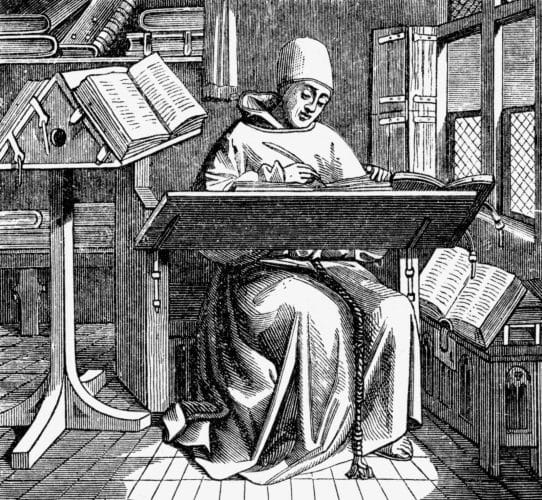The Lumen Christi Institute began a new series this quarter called, “The Great Books and the Christian Tradition,” for undergraduate students at the University of Chicago.
Many of the Great Books that students read in the university’s Core Education program are rooted in the Christian intellectual tradition. However, discussions held in secular classrooms often fail to mine the deep theological and existential themes that are explicitly a part of the texts. This new series offers students a chance to discuss and fully appreciate the Great Books in their own context.
The importance of the Great Books at the University of Chicago goes back to formative university president Robert Maynard Hutchins, who observed that the Christian intellectual tradition intertwines with the great tradition of liberal education.
“The Catholic Church has the longest intellectual tradition of any institution in the contemporary world, the only uninterrupted tradition and the only explicit tradition; that is, it is the only institution which is conscious of its tradition,” he wrote in 1937.
Hutchins was vital in the formation of the University of Chicago’s famous Core Education. The university had put the Core in place before Hutchins’s arrival, but Hutchins was concerned that it merely gushed information at students that they would soon forget. In partnership with Mortimer Adler, Hutchins made reforms to emphasize the Great Books of the past and championed seminar-style discussion courses, bringing students into conversation with the great authors and ideas of history.
Growing out of Christian scholarship at universities, and particularly the Christian scholarship of the University of Chicago, the Lumen Christi Institute continues to foster liberal education that encourages students to see and converse with the intellectual riches of history.
Liberal arts education is not alien to the Christian tradition. The early Church Fathers, including Clement of Alexandria, Justin Martyr, Origen, Ambrose of Milan, Basil of Caesarea, and Augustine of Hippo, considered the liberal arts and classic books to be useful in training servants and preachers of the Gospel. The Christian tradition of the liberal arts prizes not just the mind—the intellectual understanding of ideas and propositions—but also the heart—the emotions and one’s response to the truth. From the Catechetical School of Alexandria to monastic education, through medieval universities and Renaissance academies, Christians have developed and evolved methods of binding the liberal arts and Great Books to form the minds and hearts of students.
In line with other programming that fosters this education, Lumen Christi held four events in “The Great Books and the Christian Tradition” series this past quarter.
The first was a lively discussion with Professor Jared Ortiz, Jan. 18, on the topic, “Are the Great Books good for us? Liberal Education and the Christian Tradition.” You can watch Ortiz’s 2017 lecture on “All Things Hold Together: A Great Books Education and the Catholic Tradition” about his educational experience.
Professor Elizabeth Corey led the second discussion, Jan. 21, on the theme, “Achievement and the Christian Life: What is Education For?”
The series came to a peak as E. John Ellison, a graduate student in the University of Chicago’s Committee on Social Thought, led a crowded room in discussion over dinner Feb. 8. This event examined Augustine of Hippo’s treatment of curiosity and the uses and abuses of the intellect in his Confessions.
Dr. Jason Cather closed the series with a discussion on skeptical Enlightenment philosopher David Hume’s attempted refutation of belief in miracles and on how to view belief in miracles from a philosophical perspective.
“The Great Books and the Christian Tradition” has effectively introduced programming for undergraduates that complements the university’s commitment to the Great Books, while enrichening students’ engagement with them.
